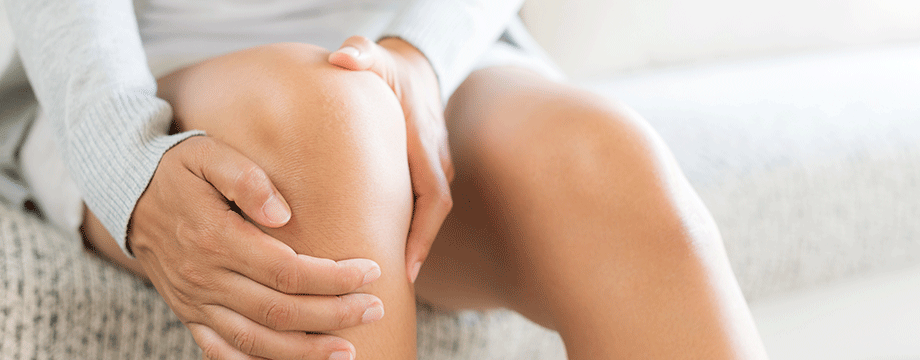5 steps to better joint health

Caroline Peyton suggests some natural ways to take care of your joints
We most commonly accept the age-related “wear and tear” of joints as a natural occurrence, but there are many natural approaches we can take to keep our joints in good order.
1 Stay hydrated
Take care to stay well hydrated. Joints contain synovial fluid that lubricates the joint surface and nourishes the cartilage. It acts as a shock absorber and a natural cushioning agent to stop joints rubbing together. A lack of fluid can lead to damaged cartilage and irritation to the joints, setting off a cascade of inflammation. Aim to consume eight to 10 glasses of fluid a day and sip over the course of the day. Try to choose hydrating fluids such as water, herbal and fruit teas, or very well diluted cordials. Keep stimulating drinks like tea and coffee to a minimum (two to four cups maximum a day).
It is best to avoid fizzy drinks. Most contain phosphoric acid and due to its acidic nature it may cause calcium to be drawn from the joints and bones. This is because calcium is alkaline, so it helps to rebalance the blood’s pH. These drinks offer no nutritional value to the body, so aim to keep them as an occasional treat if you find it hard to stay away from them completely.
2 Consume healthy fats
Joint inflammation can be caused by a number of factors. When inflammation occurs it can lead to further degradation of the joint. There are natural approaches to help dampen down the body’s inflammatory response. One reason why we are encouraged to eat oily fish (like salmon, mackerel and sardines) is due to the creation of anti-inflammatory messengers from the fats in the fish. These fats are known as EPA and DHA. The body is unable to make these fats so they must be obtained from the diet. The optimum intake is two to three portions a week, which most people do not achieve.
Fish oil supplements are very popular now, but rather than focus on the omega-3 fats, look for products containing good levels of EPA and DHA. Take advice from a nutrition professional as supplements should not be taken by people on certain medications.
Whilst there are fats that send out anti-inflammatory messages, there are also fats that can create pro-inflammatory messages in the body. These typically come from animal fats. We all require the ability to create some inflammation when there is a need to heal (after an injury for example). However the ratio of inflammatory fats is too high in the typical Western diet. Therefore, take a look at your diet and assess whether you are consuming sufficient anti-inflammatory fats and not too many pro-inflammatory fats. It is all about the balance.
3 Try a turmeric supplement
A relatively new but popular supplement for joints is turmeric. However, when looking at supplements it is the active compound curcumin that has the anti-inflammatory effect in the body. It blocks the inflammatory pathway and research has shown it to have many beneficial effects in the body.
Curcumin is poorly absorbed from the gut into the bloodstream. Unless you choose a well formulated supplement, most of the curcumin may be excreted from the body. As it is fat-soluble it needs to be taken with a meal containing fat and ideally choose an advanced formula that delivers the curcumin in a lipid formula.
4 Apply castor oil packs
The use of castor oil packs applied to a sore or swollen joint can be extremely therapeutic. Castor oil has been used since the time of the ancient Egyptians (1500BC) and it is believed to help lessen inflammation and associated pain. It is a favourite of mine in clinic as the feedback from clients is always so positive.
Simply purchase unbleached linen and natural castor oil. Soak folded linen (cut to size) with the oil, place on the joint, cover with some clingfilm (in case of oil leakage) and a towel. Then place a hot water bottle on top and leave in place for half an hour. Repeat twice a week. The linen can be kept in a container in a fridge and used up to 30 times.
5 Take a look at your diet
Gout tends to be associated with the big toe only but in fact it can occur in any joint. It is a build-up of uric acid crystals which are extremely painful in an acute situation. Some people may be more prone to a higher uric acid level in the body and may be unaware that these crystals may collect in various joints. Uric acid is created from purines in food. If you feel this may be a problem for you, it is best to avoid purine-rich protein foods like sardines, mackerel, mussels, anchovy, herring, organ meat, pâté and liver. Limit intake of medium purine foods like beef, bacon, lamb and pork. And also limit fruit due to the acid content particularly citrus fruit, strawberries and rhubarb. Tannic acid from tea is also considered to be problematic.
Poor digestion is not commonly associated with excess uric acid but it is definitely a factor to be considered. Stomach acid is required to break down proteins and a lack of stomach acid may hinder this important digestive step. It can result in a greater level of uric acid circulating in the blood stream. It is important to seek guidance from a properly qualified naturopath or nutritional therapist who can advise on the appropriate steps to support good digestion. Hydration (as already discussed) is also important with regards to the clearance of uric acid.
Caroline Peyton is a naturopath with clinics in Swindon, Cirencester and Kempsford. She also offers consultations via Zoom and Skype. For more details, visit www.peytonprinciples.com
Read previous Your Health articles here...
Read articles from our latest issue here...